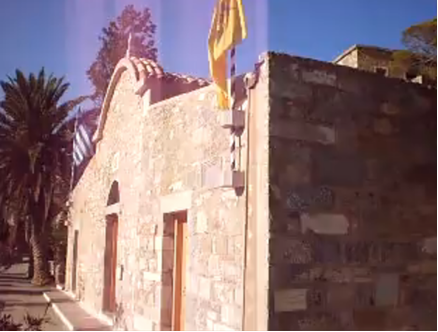One of the
historical facts that we were informed of is that
the lepers who lived on Spinalonga island were angry
at God, the reason being that their ailment was a
huge, unbearable ordeal. A priest from
Ierapetra town in Crete had dared to visit them
once, to perform a Liturgy together with the
colony's new settlers, at the church of Saint
Panteleimon that existed on the island and was
falling into ruin. They say that not a single soul
turned up at the first Liturgy.
The lepers listened
to the chanting, stubbornly remaining inside their
cells, sometimes drowning it out with their groans
and sometimes with their curses. But the
priest went there again. During that second visit,
one of the patients bravely showed himself at the
doorstep of the church, with the following
statement:
"Priest, I will
sit through your Liturgy, but only under one
condition. At the end, you will give me Communion.
And if your God is as almighty as you say, you will
afterwards conclude the Liturgy
(=by partaking of the same Chalice)
and not be afraid of my leprosy".
The priest nodded
compliantly. These words were overheard from the
neighboring cells and various individuals began to
gather near the side of the church, where there was
a small gap in the crumbling wall that offered them
a limited view of the inner sanctum. The
lepers remained in waiting until the end of the
Liturgy and watched the priest, in tears and
kneeling before the Sacred Table of Offering, as he
concluded the ritual.
A month went by.
The lepers waited for him. They were convinced that
this time he would come as a patient and not as a
priest. And yet, the priest returned, healthy and
rosy-cheeked, and with his morale invigorated began
to ring the church bell of the old chapel.
From that time on,
and for at least ten years, Spinalonga island had a
priest of its own. The lepers restored the
church by themselves, and along with the church,
they restored their faith. They took Holy
Communion regularly and they would always secretly
observe their priest during the conclusion of the
Liturgy, to make sure that the "miracle of
Spinalonga" was repeated, over and over again.
 Saint Panteleimon church, Spinalonga
Island
Saint Panteleimon church, Spinalonga
Island
In 1957, with the
discovery of antibiotics and the cure for leprosy,
the leprosarium was shut down and the island was
deserted. Only the priest remained on the
island, until 1962, offering memorial services for
the lepers, until 5 years after their death.
Behold, therefore, a
contemporary, discreet hero - one who was never
honoured for his work by anyone and - in case you
didn't notice - whose name we haven't stated, quite
simply because... we do not know it! But we
are quite sure that God knows it, and that is good
enough !
********************************